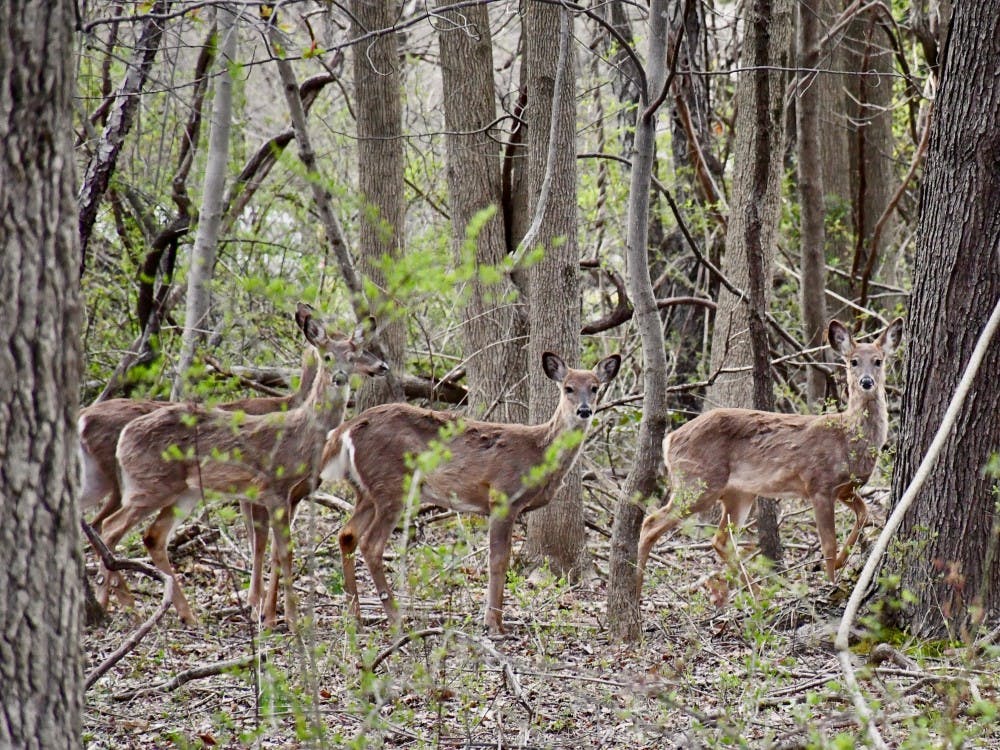Early this month, the University granted approval for three bowhunters to hunt deer on University property.
Hunting began after Thanksgiving weekend and will continue until 10 deer are removed. According to the University’s FAQ for Deer Management, killed deer will be removed and donated to a local food bank through Hunters Helping the Hungry.
The FAQ was updated by the Office of Environmental Health and Safety and Deputy University Spokesperson Michael Hotchkiss on Nov. 20 to include that the Municipality of Princeton asked the University to allow bowhunting on an area of campus known as Butler Tract, which is bound by Harrison Street, Hartley Avenue, and Sycamore Road. The tract was previously used as graduate housing and was demolished in 2016.
The official agreement between the University and the town stipulates that the three experienced bowhunters will work with the local group Suburban Deer Management to hunt in Butler Tract.
“This is a collaboration with the municipality in response to health and safety concerns and the concerns of our neighbors in the area,” Hotchkiss wrote in an email to The Daily Princetonian.
Hotchkiss also wrote it would be “impractical” and “ineffective” for the University to implement its own deer population control methods.
Following discussion and planning with members of the University, the town, and Suburban Deer Management, bowhunting was approved in early November.
After observing above-average levels of deer in Butler Tract and receiving deer-related complaints from residents, the Princeton Health Department took initiative on the bowhunting decision. According to Hotchkiss, 2018 population surveys also showed elevated populations on Butler Tract compared with other areas of Princeton.

Princeton has been following a Community Based Deer Management Plan (CBDMP), approved by the New Jersey Division of Fish and Wildlife, to control rising deer populations since 2001.
The CBDMP typically allows for hunting on public lands, but special approval was needed since the area is privately owned by the University.
According to the FAQ, the two main reasons for the deer culling are mitigation of risk of Lyme disease and car accidents.
Peter Singer, professor of bioethics and a prominent animal rights advocate, took to Twitter to respond to the new hunting policy, reposting statements made by a town resident who claimed to have received a notice from the University about the hunting.

The resident said he grew up admiring the deer near his house, and is very troubled by the existence of the hunts. He described the deer as being “part of” his life and family, and expressed concern and distress that fawns and their mothers were being separated.
“Seeing and watching these beautiful animals has become a part of my everyday life and one that I wouldn’t want to give up,” the post reads. “[T]o think that bow hunters will be eliminating these animals is absolutely heartbreaking. To think that mothers may be killed, leaving their fawns to exist by themselves and vice-versa, is extremely upsetting to me.”
Singer wrote that the deer issue “has been going on all the time I’ve been at Princeton,” and called for a more humane, non-lethal solution.
Singer cited evidence that killing deer causes the remaining population to reproduce at a higher rate in a phenomenon known as compensatory reproduction, under which does become pregnant with more twins and triplets. Furthermore, sterile does act as “placeholders” and continue to defend their territory, deterring fertile does from the land and the resources they need for reproduction.
“It’s disappointing that they haven’t put some money towards doing research to find better options,” Singer said.
He added that killing deer is not the best outcome for the animals and “not the best outcome for humans as well.”
Other options do exist for deer population management.
The two most prominent lethal methods for controlling deer populations are sharpshooting and bowhunting. Non-lethal methods include chemical fertility controls, contraceptives, and other deterrents.
According to a report release by Rutgers University wildlife specialists, an increase in suitable habitat, an abundance of food, and a lack of natural predators have all contributed to the problem of deer overpopulation in suburban areas such as Princeton.
As part of the University’s effort to manage deer overpopulation, strict regulations were created to protect people and pets. Only one hunter may be in the area at a time and must remain in an elevated tree stand in a wooded area, 20 yards away from trails, streets, and walkways.
The select hunters may only operate at specific times during the week.
“The safety of the community is our top priority through every step of this process,” wrote Hotchkiss in an email to the ‘Prince.’ “The hunters, who have worked safely throughout Mercer County for many years, will follow detailed procedures to ensure the hunt is conducted safely.”
To further address safety concerns, the University Office of Environmental Health and Safety and the Department of Public Safety interviewed and approved the hunters.








